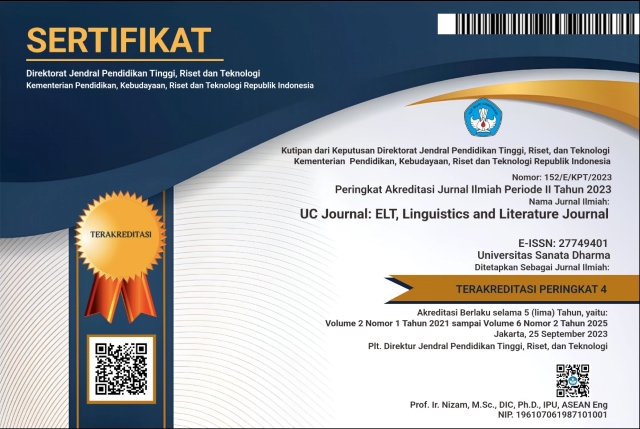THE MANIFESTATION OF RELIGIOUS AND POLITICAL RELATIONS IN THE KISWAHILI RELIGIOUS NEWSPAPERS DURING 2015 ELECTIONS
(1) Department of Foreign Languages and Linguistics - University of Dar es Salaam
(*) Corresponding Author
Abstract
Keywords
Full Text:
PDFReferences
Abbink, J. (2014). Religion and politics in Africa: The future of ‘the secular. African Spectrum, 49(3), 83–106. Retrieved from www.africa-spectrum.org.
Chouliaraki, L., & Fairclough, N. (1999). Discourse in late modernity: Rethinking critical discourse analysis. Edinburgh: University Press.
Rooij, L., & Burity, J. (2015). Liberation theology. In F. Wherry, & J. Schor (Eds.), The SAGE encyclopedia of economics and society (Vol. 1, pp. 1030-1031). SAGE Publications, Inc., https://dx.doi.org/10.4135/9781452206905.n408
Djankov, S., McLiesh, C., Nenova, T., & Shleifer, A. (2003). Who owns the media?. The Journal of Law and Economics, 46(2), 341-382. http://dx.doi.org/10.1086/377116
Eagleton, T. (1991). Ideology. London: Verso.
Fairclough, N. (1992). Discourse and social change. Cambridge: Polity Press.
Fairclough, N. (1995). Critical discourse analysis: The critical study of language. London and & New York: Longman
Fairclough, N. (2003). Analysing discourse: Textual analysis for social research. London: Routledge.
Fox, J. (1998). The effects of religion on domestic politics. Terrorism and Political Violence, 10(4), 43-63.
Fox, J. (1999). Do religious institutions support violence or the status quo?. Studies in Conflict and Terrorism, 22, 119–139.
Glickman, H. (2011). The threat of Islam in sub-Saharan Africa: The case of Tanzania. Foreign Policy Research Institute. Retrieved from www.fpri.org on 10th October 2016.
Larrain, J. (1994). Ideology and cultural identity: Modernity and the third world presence. Cambridge: Polity Press.
Lawi, Y. (2015). Trends and Patterns in Religious Conflicts in Tanzania from the Colonial Past to the Present. In: Mukandala, R. S. (Ed.). (2015). The political economy of change in Tanzania: Contestations over identity, the constitution and resources. Dar es Salaam: Department of Political Science and Public Administration.
LeSage, A. (2014). The rising terrorist threat in Tanzania: Domestic Islamist militancy and regional threats (Strategic Forum No. 288). Washington, DC: National Defence University. Retrieved from http://ndupress.ndu.edu/Portals/68/Documents/stratforum/SF-288.pdf on 27 January 2017.
Lucia, E. L. (2015). Islamist radicalisation and terrorism in Tanzania. Helpdesk Research Report on 18.5.2015 organised by Governance, Social Development, Humanitarian and Conflict. Retrieved from www.gsdrc.org/go/research-helpdesk on 27 January 2017.
Lupa, R. (2015). Religious Tolerance, Transnational Dynamics and the State in Tanzania. In: Mukandala, R. S. (Ed.). (2015). The political economy of change in Tanzania: Contestations over identity, the constitution and resources. Dar es Salaam: Department of Political Science and Public Administration.
Mbogoni, L. E. Y. (2004). The cross versus the crescent: Religion and politics in Tanzania from the 1880s to the 1990s. Dar es Salaam: Mkuki na Nyota Publishers.
Mesaki, S., (2011). Religion and the state in Tanzania. Cross-cultural Communication, 7(2), 249 – 259.
Mukandala, R., Othman, S. Y., Mushi, S., & Ndumbaro, L. (eds). (2006). Justice, rights, and worship: Religion and politics in Tanzania. Dar es Salaam: Redet/E&D Limited.
Ndaluka, T. J. (2015). Social cohesion and religious intolerance in Tanzania. In Mukandala, R. S. (Ed.). (2015). The political economy of change in Tanzania: Contestations over identity, the constitution and resources. Dar es Salaam: Department of Political Science and Public Administration.
Richardson, J. E., (2007). Analysing newspapers: An approach from critical discourse analysis. New York: Palgrave Macmillan.
Rukyaa, J. J. (2007). Muslim-Christian Relations in Tanzania with Particular Focus on the Relationship between Religious Instruction and Prejudice. Islam and Christian–Muslim Relations, 18(2), 189–204.
Said, M. (2014). Christian hegemony and the rise of Muslim militancy in Tanzania from 1970–2000”. Retrieved from www.mohammedsaid.com/2014/04/Christian/Hegemony/and/the/rise/of/Muslim/Militancy/in/Tanzania/pdf/ on 27 January 2017.
Tambila, K. I. (2006). Inter-religious relations in Tanzania. In Mukandala, R., S. Y. Othman, S. Mushi, L. Ndumbaro (eds). (2006). Justice, rights, and worship: Religion and politics in Tanzania. Dar es Salaam: Redet/E&D Limited.
Tetti, M. B., (2014). What went wrong in Tanzania: How does religious tension is threatening national unity and cohesion. International Journal of Education and Research, 2(6).
van Dijk, T. A. (2001). Multidisciplinary CDA: A Plea for Diversity. In Wodak, R. and M. Meyer. (eds). Methods of critical discourse analysis. London: SAGE Publications.
Wijsen, F. (2007). Seeds of conflict in a Haven of Peace: From religious studies to interreligious studies in Africa. Amsterdam: Rodopi.
DOI: https://doi.org/10.24071/uc.v3i1.4807
Refbacks
- There are currently no refbacks.
Copyright (c) 2022 Faraja Kristomus Lugome

This work is licensed under a Creative Commons Attribution-ShareAlike 4.0 International License.
UC Journal is indexed in:
UC Journal Sinta 4 Certificate (S4 = Level 4)
We would like to inform you that UC Journal: ELT, Linguistics and Literature Journal, or UC Journal has been nationally accredited Sinta 4 by the Ministry of Education, Culture, Research and Technology of the Republic of Indonesia based on the decree No. Surat Keputusan 152/E/KPT/2023. Validity for 5 years: Vol 2 No 1, 2021 till Vol 6 No 2, 2025
DOI: https://doi.org/10.24071/uc
e-ISSN (validity starting Vol 1, No 2, November 2020): 2774-9401

This work is licensed under CC BY-SA.
Creative Commons Attribution-ShareAlike 4.0 International License
 UC Journal: ELT, Linguistics and Literature Journal, a scientific peer-reviewed journal, was established in 20 May 2020 and is published twice a year, namely in May and November, by the English Language Education Study Programme (S1/Sarjana PBI) in collaboration with the English Education Master's Programme (S2/Magister PBI) of Sanata Dharma University, Yogyakarta, Indonesia.
UC Journal: ELT, Linguistics and Literature Journal, a scientific peer-reviewed journal, was established in 20 May 2020 and is published twice a year, namely in May and November, by the English Language Education Study Programme (S1/Sarjana PBI) in collaboration with the English Education Master's Programme (S2/Magister PBI) of Sanata Dharma University, Yogyakarta, Indonesia.














